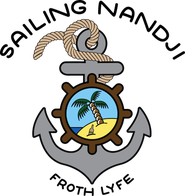"Some people think we're crazy, we don't have a lot of sailing experience and have just bought a 40 foot yacht! Follow us on our journey as we learn to navigate the seas and all of the adventures that come with living on the ocean. We believe that life should be an adventure and you can accomplish anything if you are passionate and dedicated."
The transition from land to sea...
July 2016
Now that we have been living on Nandji for nearly three months, I feel we are equipped with enough experience to decipher the good, the bad and the general transition from land to sea. The first major difference being that every thing constantly moves. Even at anchor in the bay, the boat constantly rolls. After the initial sickness feeling and "gaining your sea legs" as they say, I have learned to love this rock. I sleep like a baby now! In saying that, we are still yet to sail for a greater period of time than 14 hours, so have not tested the sleep when we are moving. I can already predict this is going to take alot to get used to. Baby steps.
The next major difference is getting used to how long everything takes. Any task is doubled in the amount of time you spend. A simple food shop takes forever as you have to drag all the food in and out of the tender. Up onto the boat and then down stairs. Then put it all away in hard to reach places. However to a degree, living in our bus froth prepared me for the end bit of this task. I am used to getting on my knees to dig through the bottom cupboard to dislodge the box of biscuits that are stuffed in and around the corner.
Then there is the issue of water. Nandji can hold 250 litres when fully loaded up. However since we are constantly at sea and not in a marina, the only way of getting water from land to Nandji is via two 20L water containers. This task is up there with my least favourite. I am not the strongest tool in the shed and lifting 20kg out of a rocking tender onto Nandji is not the easist of activities. To then repeat this process 5 or 6 times (depending how good a pour I am) is not my idea of fun. Just one of those tasks that need to be done.
Overall though, the transition has been relatively easy and very rewarding. The future looks bright and the thought of the adventures on the horizon makes the froth start to form at my mouth. Yew!
Captain Yosh
The next major difference is getting used to how long everything takes. Any task is doubled in the amount of time you spend. A simple food shop takes forever as you have to drag all the food in and out of the tender. Up onto the boat and then down stairs. Then put it all away in hard to reach places. However to a degree, living in our bus froth prepared me for the end bit of this task. I am used to getting on my knees to dig through the bottom cupboard to dislodge the box of biscuits that are stuffed in and around the corner.
Then there is the issue of water. Nandji can hold 250 litres when fully loaded up. However since we are constantly at sea and not in a marina, the only way of getting water from land to Nandji is via two 20L water containers. This task is up there with my least favourite. I am not the strongest tool in the shed and lifting 20kg out of a rocking tender onto Nandji is not the easist of activities. To then repeat this process 5 or 6 times (depending how good a pour I am) is not my idea of fun. Just one of those tasks that need to be done.
Overall though, the transition has been relatively easy and very rewarding. The future looks bright and the thought of the adventures on the horizon makes the froth start to form at my mouth. Yew!
Captain Yosh


